- Home
- A. S. King
Glory O'Brien's History of the Future Page 2
Glory O'Brien's History of the Future Read online
Page 2
“I told you. I don’t care,” I’d said.
I picked up my camera and held it at arm’s length and took a picture of myself not caring. I called it: Glory Doesn’t Care.
The Zone System
Everyone in school on those last days posed. Before then, I’d catch them at their desks working, or in the computer lab researching, or in the library reading. They never looked up. On Monday, three days of school left, they made funny faces. On Tuesday, they hugged a lot. The last day of school for seniors, the Wednesday before graduation, everyone looked right into my camera and smiled or grabbed friends and acted as if they would never see each other again—as if they were never going to have a class reunion, as if we were all going to die on graduation day. You could see the fear in their faces, masked by joy, but it was there. I snapped picture after picture even though I didn’t plan on sharing any of them.
“Us! Us!” a group of jazz band girls said. Snap.
“Can you take a picture of us, too?” nearby vo-tech guys said. Snap.
“Hey, Glory! Take a picture of us, willya?” Football cheerleaders draped all over each other. Snap.
On the way to lunch for the very last time, there were three girls who never liked me because of the FEMINISM IS THE RADICAL NOTION THAT WOMEN ARE PEOPLE bumper sticker on my [dad’s] car, one of whom claimed this made me a dyke back in eleventh grade. “Last day at lunch! Come on. Take a shot of us buying our last crappy high school food.”
I did.
But they didn’t know that I focused on the chicken nuggets, soggy fries and lump of macaroni salad on their plates instead of their clueless faces.
It would seem from this that I was popular, and with my camera, I was. My camera kept me safe. Kept me in good standing with people who wanted a picture of themselves. Kept me behind the camera rather than in front of it. I even skipped the one group picture I should have been in for yearbook—which was the yearbook club picture. I didn’t get regular senior pictures taken either. Instead, I submitted a self-portrait with my eyes closed. I had to fight to get them to include it. Luckily, the only pull I had in school was with the yearbook advisor.
The picture looked like me, dead.
I was interested in death the way Ellie was interested in sex. The less adults talked to us about things, the more we wanted to know, I guess.
Anyway, I knew that one day the picture would be accurate, because everyone dies.
I got my first camera from my mother for my fourth birthday. I wasn’t allowed to use it, but it was mine… for the future, which, looking back, is a bizarre idea when one’s mother doesn’t make it to one’s fifth birthday. But anyway. It was a very simple Leica M5 in a leather case. Not a digital camera. Darla O’Brien believed in film. She believed in emulsion and silver halide. She believed in something called the Zone System, which was developed by two photographers named Ansel Adams and Fred Archer around 1940.
The Zone System divided the tones in a black-and-white photograph into eleven zones between maximum black and maximum white. The challenge was to make an image that represented all eleven zones. Maximum white was 10. Maximum black was 0. Max white was blown out. Max black was nothingness.
Max black was my code for dead. “Max Black” would be what I secretly called the petrified bat because I was picky about saying something was what it wasn’t. The bat was not petrified. Minerals couldn’t have replaced its cells. It was just dead. Zone 0. Max black.
My one regret was that I never photographed the bat before we drank it. It would have made such a great image—so many zones represented, standing at attention, carving themselves into the emulsion. It would have represented me. Glory O’Brien, light as a feather. Glory O’Brien, jarred. Glory O’Brien, faking everyone out looking alive when really I was disintegrating. Glory O’Brien, wings folded, not flying.
I’d taken a picture of the jar, of the picnic table, of Ellie staring into the bat’s mummified eyes, but I never took a shot of the bat itself. Maybe this meant something. Maybe it didn’t. You choose.
Maybe I was avoiding death at the same time as I was obsessed with it.
Humans are weird, right? We’re walking contradictions. We are zone 10 and zone 0 at the same time. We aren’t really sure.
Or, at least, I wasn’t. But that was a secret.
I loved the challenge of the Zone System, but I had never tried it. Darla’s darkroom was off-limits. It was an acrid-smelling shrine in the basement where her secrets lived. And the more my own secrets emerged, the more I wanted to get into that darkroom and compare our notes.
Did she get those dizzying panic attacks too? Was this a sign?
What about not wanting to make friends?
What about not trusting people, in general? Was that normal?
What about feeling lost in the world? Lost in my own future?
What about my curiosity about what she did to herself? Why did she do it? Why did she seal the kitchen door with wet towels to spare me the gas?
Did she really spare me? Was this what spared felt like?
Boobs
Max Black would bring me closer to God than anyone ever did. Eventually.
Up until then, no one had ever convinced me that there was a real God. Not the priest who buried my mother when I was four years old, not my aunt Amy, who tried to school me in Catholicism after Darla died.
Because no god would make my mother put her head in the oven.
Not with me in the house.
Not on Letter N Day.
No god would let my dad suffer so much that he ended up resembling a hairy hot-air balloon. No god would make him ride one of those Jazzy carts at the supermarket like old people do because his knees hurt too much to walk.
He was only forty-three years old.
I was seventeen when I drank the bat with Ellie. Seventeen is the average age of one’s first sexual encounter in America. I’m not sure what the average age of bat ingestion is.
The average age of childbearing in America is about twenty-five, which is when Dad and Darla had me. But nothing else about Darla and Dad was average.
Darla was a nearly famous photographer. Dad, before his present incarnation as the man on the Jazzy in the freezer aisle, was a painter. They built this house with the money Darla inherited from her mother after she died from non-microwave-oven cancer in 1990. Darla inherited $860,000, which was a lot of money. Her sister, Amy, inherited the same amount and blew it all on frivolous things. A tanning bed. Trips to Mexico. Bigger boobs. Shoes. A lot of shoes.
As sisters go, they were as opposite as Helen of Troy and Clytemnestra. Sadly, the immortal one in this case was too distracted by sales at Macy’s to start the Trojan War or launch a thousand ships.
After Darla died, Aunt Amy tried for years to con me into having a First Communion in a pretty white dress. She would try to teach me about confession and sin and the Virgin Mary, but all I could see when she told me about Catholicism were her weird, round, wobbly silicone boobs.
She always wore low-cut tops.
Even when she dressed to sell God to little motherless girls.
Amy didn’t come around anymore. I didn’t expect a graduation card or any sort of present from her, though she did still send birthday cards—usually with overly girly motifs that made me want to puke. Amy always had a way of going over the top because I told her I was a feminist when I was twelve, and she told Dad he’d brainwashed me into being some sort of half-boy.
Which was bullshit. I was not a half-boy. I was still totally myself. I just wanted Aunt Amy to get paid as much as a man if ever she got off her lazy ass and got a job.
Why did everyone mix up that word so much?
My dad didn’t brainwash me; I was simply aware. And from the looks of things around my high school, I was in the minority.
Ellie told me once that the feminist years were over.
“What the hell does that mean?” I’d asked.
“It means that’s so 1970s or something. Twentieth-
century.”
I looked her up and down. “And hippie communes are twenty-first-century? Seriously?”
“You know what I mean,” she said. “It’s over. We got what we needed. We don’t have to fight anymore.”
I remember exactly what I said that day when she said that. I said, “Homeschooling is making you stupid.”
But it wasn’t homeschooling.
She’d said what most people really think.
Empty plastic
I hadn’t always been the yearbook photographer. Halfway through senior year, they asked me to step in. Ms. Ingraham, the yearbook advisor, said she figured I’d have a good eye. She did not mention why she figured this. She did not mention that I might have inherited my eye from Darla-whose-eyes-no-longer-saw.
“John Risla was expelled,” Ms. Ingraham said.
“I heard.” He was a serial plagiarizer. We all knew it was coming.
“Do you think you’d like to be our yearbook photographer for the rest of the year?”
“Sure,” I said. “But I don’t want to be part of the club.”
“But—I…” she stammered.
“I just want to take pictures,” I said. “That’s all. No club.”
“Okay,” she said. “That would be great.”
Dad supplied the camera—a digital. To make myself feel better about using a digital, I tried to shoot every yearbook picture using the Zone System.
It was totally possible. Just because it was invented by two guys who used to make their own emulsion and paint it on 20 × 24-inch glass plates in the 1940s didn’t mean the Zone System couldn’t be used by anyone using any kind of camera.
It was all about exposure.
While everyone else my age had their digital cameras set to automatic, I dug out Darla’s old handheld light meter.
A light meter could tell you what zone everything in a scene fell into. Bright spots—waterfall foam, reflections, a polar bear—were high numbers. Shadows—holes, dark still water, eels beneath the surface—were low numbers. You had to let the light into the camera in just the right way. You had to meter: find the dark and light spots in your subject. You had to bracket: manually change your shutter speed or aperture to adjust the amount of light hitting the film—or in my case, for the yearbook, the microchip. You didn’t want to blow out the highlights, and you had to give the shadows all the detail you could by finding the darkest max black areas and then shooting them three zones lighter.
By shooting the darkest areas three zones lighter, you turned a black, lifeless max black zone 0 into a zone 3.
I think, in life, most of us did this all the time.
You essentially called the woman in the oven “unhappy.” You called her “frustrated.” And you called the family who was left over “grieving.” You called them “hanging in there.” You called them “dealing with it pretty well.”
Everything is about detail in the Zone System, so if you shoot a zone 0 as a zone 0, there is nothing you can do with your exposure that will bring any detail to that zone. It is max black. There is no emulsion left on the negative. All you have is empty plastic.
That’s how I felt about Darla. Like empty plastic.
Dad would say, “Come on, Cupcake, it’s not that bad.”
I wondered if that was what he’d said to Mom on Letter N Day. I wondered if his meter was off. If he was accidentally reading threes where there were zeroes. Or purposefully. You choose.
Dad was a recluse outside of his trips to the grocery store, which usually happened between 2 AM and 4 AM on a random weekday night. He never seemed to think about art anymore.
Now he just made calls all day from the couch and worked on his laptop. He got paid to help people through their computer issues. I always hoped that deep in his brain he was brewing a series of German expressionist paintings of domestic gas ovens and one day he would paint it.
After school on Wednesday—the last day of school before graduation—I went over to see Ellie with my camera to show her the pictures I’d taken of the kids posing at me all day as if they were movie stars.
As I walked across the road, I noticed no one was really around at the commune, which was strange because a lot of people lived there. Three families in the barn, two in the old hunting cabin out back, two in the ugly blue-sided prefab, and then the RVs, three or four of them, with a family apiece.
Of course, Jasmine lived in the best house—the old farmhouse—with Ellie and Ed Heffner, Ellie’s father, who I rarely saw on account of his being a hermit.
Ellie said he was shy. When I met him the few times I did, though, he just seemed annoyed. I wasn’t sure what he had to be annoyed about. Dad said none of them worked. They lived off the land and got by without having to have jobs, which sounded like heaven to me. Dad said they were nonconsumerists and when I asked him what that meant he said they didn’t want to buy anything.
When I found Ellie, I could tell something was wrong with her, but when I asked, she said, “I’m fine.”
I didn’t push because I didn’t really feel like caring. She was wearing a hippie shirt with the buttons undone just to the edge of the warning zone. Like Jasmine did. It could have been Jasmine’s shirt for all I knew. Jasmine could have been the one who suggested to unbutton it to that point… while at the same time saying If you have sex too early, you’ll regret it.
Ellie wasn’t graduating with me, so I couldn’t officially celebrate my last day of school ever with her, but I showed her the pictures on my camera.
“Who’s that?” she asked, pointing at the tall guy from jazz band.
“Travis something. Johnson. Travis Johnson,” I said.
“Shit. He grew.”
“And that’s Morgan,” I said, pointing to an old busmate of ours.
“Damn! She’s punk rock. Who knew?”
“I know, right?” Morgan used to be a geek. Then she found Joey Ramone.
“Is that Danny?” Ellie asked. Danny was her secret eighth-grade crush. In the picture, his girlfriend was hugging him and kissing his cheek.
“Yep.”
“Huh. He isn’t as cute anymore somehow.”
“Yeah. A lot changed since eighth grade,” I said.
“So today was your last day?” she asked.
“Yeah.”
“Why aren’t you out eating at McDonald’s or at the diner or something to celebrate? Like—the normal things seniors do?”
My yearbook club had invited me to the diner. But I wanted to come home on the bus one last time. (I took a picture of the interior of the bus after everyone but me and a kid named Jeff got off. I called it: Empty Bus.)
“Nah. I’m just glad it’s over,” I said.
“Why? You’ve been ignoring all those college letters, right? Why be happy something is over when there’s nothing to go to next?”
I looked at her and frowned. “I don’t know.”
“Oh.”
“I’ll figure it out.”
“You will.”
I clicked forward on my camera setting and showed her Empty Bus.
“What’s that?” she asked.
“It’s the empty bus. It’s, like, the last empty thing that has to do with school or something. Or it’s some sort of proof that I don’t have to do that anymore. I don’t know. But today was the day I had to take it.”
“My mom says I’ll graduate over the summer sometime, maybe,” she said. “They send me a real diploma and everything.”
I said, “That’s nice.” But I was pretty sure she was lying.
Obligate parasites can’t live without a host
The next morning, my first day of no-school-ever-again, I went to Ellie’s. As I crossed the road I felt weird about it—I asked, Why am I always going to Ellie’s? The answer was a shrug. I don’t know why you’re going to Ellie’s. You always go to Ellie’s. You don’t have anywhere else to go.
I found her on her back porch, sulking.
“Last night my mom said it might take until D
ecember for me to graduate,” she said. “She says I shouldn’t rush the most important thing in life.”
“Is that why you’ve been so pissed off?” I asked.
“Yeah,” she answered. “And other stuff.”
“Boyfriend stuff?”
“Maybe.”
Ellie’s boyfriend’s name was Rick. He was nineteen and he’d lived on the commune since he was seven and we used to call him Ricky. He bragged that he’d had sex a lot, but Ellie and I couldn’t figure out where or how because the commune was small and it wasn’t like there were a ton of girls to have sex with.
“He’s acting weird,” she said. “Like he doesn’t like me anymore.” She waited a second to see if I’d say anything and when I didn’t, she added, “And some of the kids have lice and I can’t stand lice.”
“Bummer,” I said, because lice on the commune was more common than lavender bushes, knitting, or basmati rice. I backed away. I think this is a normal human reaction.
She scowled. “It’s not like I have them! Geez!”
“It’s lice. They jump. I learned it in health class.”
“Lice don’t jump.”
“Oh,” I said, still keeping my head at least a meter from her head.
“Fleas jump. Lice crawl.”
She said it like it was a normal thing to be talking about. Fleas jump. Lice crawl. I said, “You can’t blame me for not wanting to get lice. Who wants lice?”
“I don’t have them! I just know we all have to be careful because some of the kids have them.” She started to cry a little. “I’m so fucking sick of this shit, you know that?”
I thought she meant me, so I kept my mouth shut. Ever since Rick showed up in her life, I was hoping she’d get sick of me. I’d even daydreamed about starting a new life somewhere else, anywhere else. A place where no one knew about Darla and no one would seem insensitive for not talking to me about it.
“The minute I turn eighteen, I’m getting the hell out of here. With Rick, maybe. He’s getting out, too. And we can get our GEDs and won’t have to homeschool anymore.”

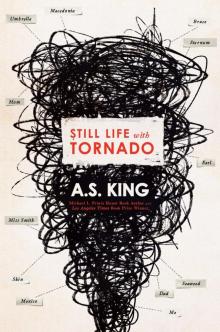 Still Life With Tornado
Still Life With Tornado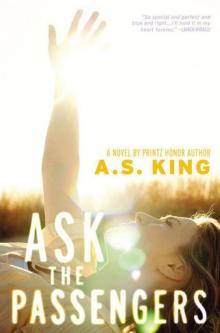 Ask the Passengers
Ask the Passengers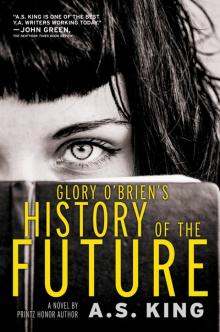 Glory O'Brien's History of the Future
Glory O'Brien's History of the Future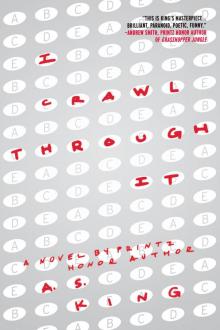 I Crawl Through It
I Crawl Through It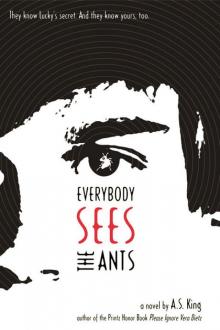 Everybody Sees the Ants
Everybody Sees the Ants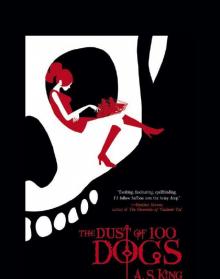 The Dust of 100 Dogs
The Dust of 100 Dogs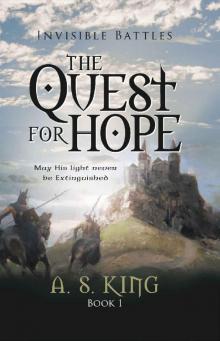 The Quest for Hope | Christian Fantasy Adventure (Invisible Battles Book 1)
The Quest for Hope | Christian Fantasy Adventure (Invisible Battles Book 1)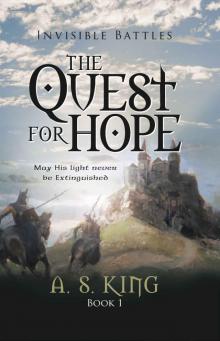 The Quest for Hope | Christian Fantasy Adventure
The Quest for Hope | Christian Fantasy Adventure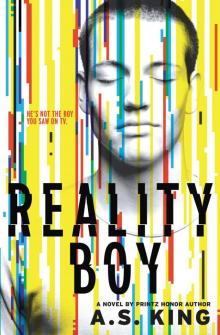 Reality Boy
Reality Boy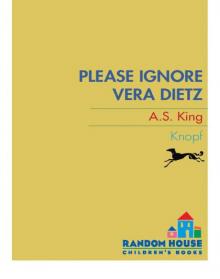 Please Ignore Vera Dietz
Please Ignore Vera Dietz